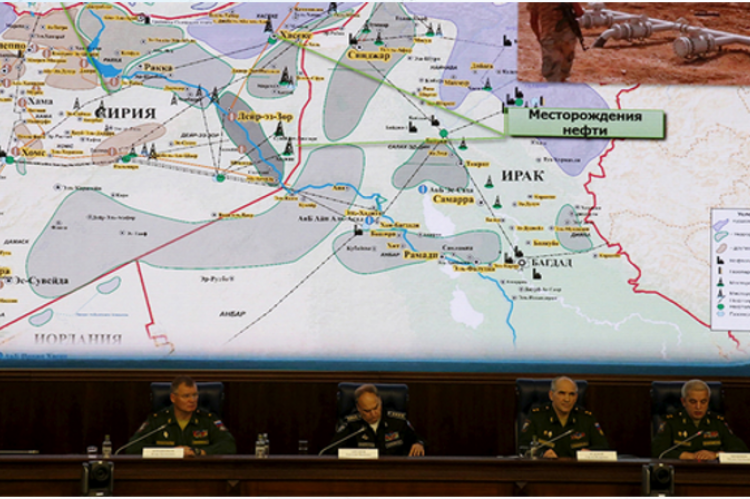Claim: Turkey purchasing DAESH-produced oil
Iran’s state-owned news portal Press TV relays allegations made by Russian Defense Ministry that Turkey purchases oil produced by DAESH terror group
On 7 February 2016, Iran’s state-owned English language broadcaster Press TV relayed allegations made by Russia’s Defense Ministry that Turkey is purchasing oil from the DAESH terrorist group at the end of an article about Turkey’s refugee policies.1 The allegations stem from information released on 2 December 2015 by the Russian Defense Ministry, which released a number of maps, pictures and videos claiming to be proof that Turkey is smuggling oil from DAESH-controlled territories from three main routes.2 However, the information released by the ministry were dismissed by authorities internationally.
The map shown by Russia was not up to date as some areas in Syria like Afrin, Hasakah and Qamishli were shown as being under DAESH control, even though they are in fact currently under the control of the YPG (People's Protection Units), which is opposed to DAESH. Regarding the allegation about the three oil routes, the following problems exist:
● The first route shows oil produced at fields near the city of Raqqa in Syria being taken to the town of Azaz on the border with Turkey before passing to the Turkish border city of Reyhanli. This router passes through Afrin, which is under the control of the YPG.
● The second route shows oil being smuggled from Deir ez-Zor to the Syrian border city of Qamishli, before the oil is passed to the city of Batman in Turkey for refining. However, the refineries in Deir ez-Zor is under the control of the Syrian regime and Qamishli is held by the YPG. Between Qamishli and Batman there is no road. Furthermore, the refinery in Batman is run by Turkish Petroleum Refineries (TUPRAS), which also made a statement denying such claims.3
● The third route shows oil being transported from eastern Syria and western Iraq into the southeastern corner of Turkey. The Kurdistan Regional Government (KRG) spokesman Safeen Dizayi dismissed Russian allegations that DAESH sells oil to Turkey through the Kurdish region. The KRG’s energy commission head Serko Cevdet also said, "The KRG exports its oil via pipelines and tankers to Turkey for sale to buyers around the world" and that the Russian satellite images showed tankers carrying oil from the Kurdish region to Turkey’s Port of Ceyhan.4
Another thing that needs to be pointed out regarding the videos released by the Russian Defence Ministry is that the alleged oil tankers are in fact trucking rigs with containers and that it is logistically impossible to transfer oil with such small containers.45
The allegations of the Russian Defence Ministry were also rejected by the US State Department Spokesman Mark Toner. Toner said “There is no Turkish government complicity in some operation to buy illegal oil from DAESH. We just do not believe that to be true in any way, shape or form.”6
US State Department Spokeswoman Julia Manson, in an interview with Turkey’s state-run press agency Anadolu Agency, also rejected the allegations, saying: “We reject the premise that the Turkish government is in league with ISIL (DAESH) to smuggle oil. We have seen no evidence to support such an accusation.”7
US Director of the Office of Foreign Assets Control (OFAC) Adam Szubin said in a press briefing in the White House on December 2015: “We do not see any evidence that the Turkish government is purchasing oil from ISIL (DAESH).”8
German newspaper Der Spiegel also refuted the claims by addressing various problems9 in the claims, while German Foreign Ministry deputy spokeswoman Sawsan Chebli said that Bashar al-Assad’s Syrian regime is actually the main importer of DAESH oil, stating that the regime received “large amounts of oil” from DAESH. Chebli said the German government had “indications showing that this is the case.”
- 1. http://www.presstv.com/Detail/2016/02/07/449078/Turkey-Syria-Erdogan-Syr...
- 2. http://www.reuters.com/article/us-mideast-crisis-russia-turkey-idUSKBN0T...
- 3. http://www.tupras.com.tr/detailpage.tr.php?lPageID=7531
- 4. a. b. http://aa.com.tr/en/turkey/krg-dismisses-russian-claims-of-daesh-oil-sal...
- 5. http://www.dailysabah.com/diplomacy/2015/12/03/iraqi-kurds-refute-russia...
- 6. http://www.usatoday.com/story/news/world/2015/12/02/russia-claims-turkey...
- 7. http://aa.com.tr/en/turkey/us-dismisses-russian-claims-turkey-buying-dae...
- 8. https://www.whitehouse.gov/the-press-office/2015/12/16/press-briefing-pr...
- 9. http://www.dailysabah.com/diplomacy/2015/12/04/germany-one-by-one-debunk...



